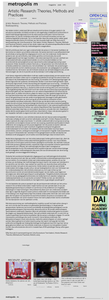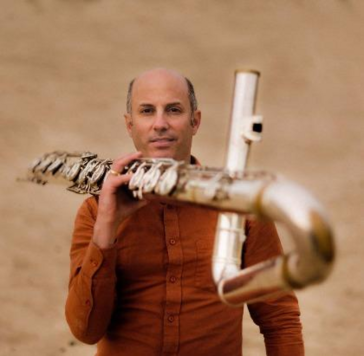Het debat rondom onderzoek lijkt een steeds prominentere rol te gaan spelen in de actuele kunstpraktijk. Inmiddels worden er ook regelmatig in Nederland conferenties en expertmeetings georganiseerd over de wijze waarop onderzoek in de kunsten kanplaatsvinden, en hoe dit ‘artistieke onderzoek’ zich verhoudt tot andere vormen van (wetenschappelijk) onderzoek. Tot nu toe leverden deze discussies echter zelden goedbeargumenteerde criteria of richtlijnen op. Het nieuwste boek van Mika Hannula (in samenwerking met Juho Suoranta en Tere Vaden) Artistic Research: Theories, Methodsand Practices (Helsinki, 2005) wil een einde maken aan dit wetenschapsfilosofische tekortdoor zich volledig te richten op methodologische vraagstukken.
DOCUMENT

Photography’s modern day quest was the reason for the research group Image in Context to start up a centre of expertise in which the insights ofphotographers and artists concerning this problematic status of photography can be brought together and studied. This centre of expertise PRICCAPractice (PhotographicResearch in Cross-disciplinary and Cross-cultural Artistic Practices) conducts researchinto the way in which professional photography is reinventing itself. It is aimed at theartistic research practices of artists, designers and photographers into the status ofphotography in our society. The focus lies on newly developed methods concerningphotography as part of an interdisciplinary artistic (and critical) research practice;photography as a means of research to make reality visible again. For this reason it makes sense that photography should allow itself to be nourished and inspired by other reality seeking disciplines, such as sociology and anthropology. Based on her interest in processes which are socially meaningful, photography moreover connects itself with fields of study such as semiotics, cultural studies, art theory and philosophy. And in her forms of expression she learns from literature, theatre, and journalism as forms of representation. In other words, the centre of expertise researches how dimensions of reality in photography are made into problems in images which are not merely representations, but also a commentary on photography itself and which explore the narrative and communicative possibilities and limitations of the photographic image at the same time. We are looking for artistic research practices in which a new, authentic relationship between the photographic image and reality will be researched.In this paper I would like to present a few of these practices.
DOCUMENT

Artistic research is a relatively new form of research that makes use of the attitudes and methods of artists and designers during the research process. This simply implies that researchers work from a visual and associative perspective and have an open attitude that makes it possible for them to notice that which others may fail to see. For a better understanding, we will place artistic research next to three other research paradigms in this text: design-oriented research, practice-oriented research, and academic research. We do this in order to make the social relevance of artistic research visible, a notion that stems from the direct ambition to create a space for artistic research in which the elderly, caregivers, and researchers can gather new insights. Not only does this topic require extra attention because artistic research has a different social value, but also because it is still relatively young: artistic research needs to develop its vocabulary to make itself intelligible towards the already more developed forms of research. This article is an initial attempt in doing so.
LINK
Students in Higher Music Education (HME) are not facilitated to develop both their artistic and academic musical competences. Conservatoires (professional education, or ‘HBO’) traditionally foster the development of musical craftsmanship, while university musicology departments (academic education, or ‘WO’) promote broader perspectives on music’s place in society. All the while, music professionals are increasingly required to combine musical and scholarly knowledge. Indeed, musicianship is more than performance, and musicology more than reflection—a robust musical practice requires people who are versed in both domains. It’s time our education mirrors this blended profession. This proposal entails collaborative projects between a conservatory and a university in two cities where musical performance and musicology equally thrive: Amsterdam (Conservatory and University of Amsterdam) and Utrecht (HKU Utrechts Conservatorium and Utrecht University). Each project will pilot a joint program of study, combining existing modules with newly developed ones. The feasibility of joint degrees will be explored: a combined bachelor’s degree in Amsterdam; and a combined master’s degree in Utrecht. The full innovation process will be translated to a transferable infrastructural model. For 125 students it will fuse praxis-based musical knowledge and skills, practice-led research and academic training. Beyond this, the partners will also use the Comenius funds as a springboard for collaboration between the two cities to enrich their respective BA and MA programs. In the end, the programme will diversify the educational possibilities for students of music in the Netherlands, and thereby increase their professional opportunities in today’s job market.

The main aim of the project is to provide new research in the arts by focusing on the concept of the inter-sensorial as an essential text for the creation of art and culture. It is designed to foreground the role of the sensorium as an underpinning source for many aspects of thought and cultural heritage. This project will blend visual arts with applied arts and traditional local traditions, revealing new light on the artistic facets and customs which are usually overlooked.The extended residencies will promote transnational mobility for emerging artists, facilitating international relationships between different artistic and cultural contexts within the EU. This will promote transnational interconnectivity between artists and cultures, creating a resourceful intercultural fertilisation, endorsing cultural diversity, social inclusion and most of all, further research on the intercultural facets.Through the various side-activities to take place during the mobilities of the artists, the project aims to strengthen and develop diverse audiences by producing the necessary elements for a dialogue, illustrating interpretations of rich layers of tangible and intangible heritage and legacies of European countries related to the tradition of sensorial experiences and how they evolved around traditional customs. Furthermore, it also aims to rethink and project new and innovative ways for documenting, preserving and communicating data to different audiences.
This PD project aims to gather new knowledge through artistic and participatory design research within neighbourhoods for possible ways of addressing and understanding the avoidance and numbness caused by feelings of vulnerability, discomfort and pain associated with eco-anxiety and chronic fear of environmental doom. The project will include artistic production and suitable forms of fieldwork. The objectives of the PD are to find answers to the practice problem of society which call for art that sensitises, makes aware and helps initiate behavioural change around the consequences of climate change. Rather than visualize future sea levels directly, it will seek to engage with climate change in a metaphorical and poetic way. Neither a doom nor an overly techno-optimistic scenario seem useful to understand the complexity of flood risk management or the dangers of flooding. By challenging both perspectives with artistic means, this research hopes to counter eco-anxiety and create a sense of open thought and susceptibility to new ideas, feelings and chains of thought. Animation and humour, are possible ingredients. The objective is to find and create multiple Dutch water stories, not just one. To achieve this, it is necessary to develop new methods for selecting and repurposing existing impactful stories and strong images. Citizens and students will be included to do so via fieldwork. In addition, archival materials will be used. Archives serve as a repository for memory recollection and reuse, selecting material from the audiovisual archive of the Institute of Sound & Vision will be a crucial part of the creative work which will include two films and accompanying music.